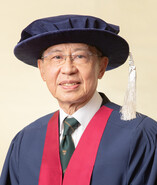
Honorary University Fellows

Professor Cheng Kai Ming, Emeritus Professor and Honorary Director of the Education Policy Unit in the HKU Faculty of Education, is globally renowned as an expert on education policy and development, a respected university leader, and a distinguished and loyal alumnus of the University of Hong Kong.
He holds, inter alia, a BSc (Physics and Mathematics, 1966), a Special BSc (Mathematics, 1967), and a MEd (Management and Planning, 1983) from the University of Hong Kong, and a PhD (1987) from the Institute of Education, University of London (now University College London (UCL)).
Professor Cheng was the founding Principal of Elementi College, became active in the local education policy arena in the 1970s, and would be instrumental in launching comprehensive education reform initiatives in 1999 as a member of the Education Commission.
After 15 years teaching in schools, of which nine years were as a school principal, Professor Cheng joined the Faculty of Education at HKU in 1984, and has been with the Faculty ever since. His research focuses on educational planning, policy-making and reforms. His course on Qualitative Research was the first of its kind at HKU. His course about education and culture, which he started at the Harvard Graduate School of Education as Visiting Professor (1996-2006), has become his signature course.
Professor Cheng was appointed Chair Professor in 1995, and has served in many leadership positions at HKU, including Dean of Education, Pro-Vice-Chancellor, Senior Adviser to the Vice-Chancellor, as well as Warden of Old Halls and Lee Hysan Hall, and Master of Robert Black College. He was instrumental in creating the Development and Alumni Affairs Office in 1999 – actively championing the endeavours of the University across all disciplines, and vigorously growing a culture of philanthropy and institutional advancement, not only at his alma mater, but throughout Hong Kong society.
He was the first to study China’s education in the early 1980s, and has been appointed visiting professor by many pre-eminent universities in China. He is member of the China Education 30 Forum.
Globally, Professor Cheng has served as consulting researcher for many major international organisations, including the World Bank and UNESCO, which brought him to rural villages around the world. He has been involved in policy discussions, evaluation and training in various countries. He is known for his focus on changes in society and their challenges to education.
Citation delivered by Professor Ian HOLLIDAY, Vice-President and Pro-Vice-Chancellor (Teaching and Learning)
Professor Cheng Kai Ming, Emeritus Professor and Honorary Director of the Education Policy Unit in the HKU Faculty of Education, is globally renowned as an expert on education policy and development, a beloved teacher, a respected university leader, and a distinguished and loyal alumnus of the University of Hong Kong.
“Ching Sir”, the name he is affectionately known by at HKU, was born in 1944 in the unoccupied city of Kunming, hence the “Ming” in his name. He moved with his family from Shanghai to Hong Kong in March 1949 and recalls that he attended seven different schools before university!
Professor Cheng holds, inter alia, a BSc in Physics and Mathematics (1966), a Special BSc in Mathematics (1967), and a Master of Education in Management and Planning (1983) all from the University of Hong Kong, and a PhD (1987) from the Institute of Education at the University of London, now University College London.
Professor Cheng was the founding Principal of Elementi College, a private secondary school in the working-class area of Shau KeI Wan, and also taught at the prestigious St Paul’s College across the road from HKU.
He became active in local education policy in the 1970s and went on to be an influential member of the Education Commission, which launched comprehensive education reform in 1999, triggering the 3-3-4 structural changes to the education system.
After 15 years of school teaching, including nine years as a school principal, he joined HKU’s Faculty of Education in 1984. He’s been with the Faculty ever since.
Professor Cheng’s research focuses on education planning, policy-making and reform. His course on Qualitative Research was the first of its kind at HKU, and became his signature course here. He was a Visiting Professor at Harvard Graduate School of Education from 1996 to 2006, where he was renowned for his course on Culture and Education. He was the first to study China’s education system in the early 1980s, and has been visiting professor at many pre-eminent universities in the Mainland. He is a member of the China Education 30 Forum.
Professor Cheng was appointed Chair Professor at HKU in 1995, and served in many leadership positions, including Dean of Education, Pro-Vice-Chancellor, Senior Adviser to the Vice-Chancellor, Warden of Old Halls and Lee Hysan Hall, and Master of Robert Black College. Since the 1980s, he has regularly shared his expertise and insights in a weekly column in the Hong Kong Economic Journal – which he still writes, so please don’t miss his next article!
Professor Cheng was instrumental in creating HKU’s Development and Alumni Affairs Office in 1999 – actively championing the endeavours of the University across all disciplines, and vigorously growing a culture of philanthropy at his alma mater and throughout Hong Kong.
Globally, he has served as consulting researcher for many major international organisations, including the World Bank and UNESCO, which brought him to many villages around the world. He has been involved in policy discussion, evaluation and training in numerous countries, and is known for his focus on social change and its impact on education. He is an Honorary Fellow of UCL’s Faculty of Education and Society and a Fellow of the Hong Kong Educational Research Association.
Mr Pro-Chancellor, it is my great pleasure to present my colleague and friend, “Ching Sir”, Professor Cheng Kai Ming, for the Honorary University Fellowship, in recognition of his substantial contribution to academia and to Hong Kong.
